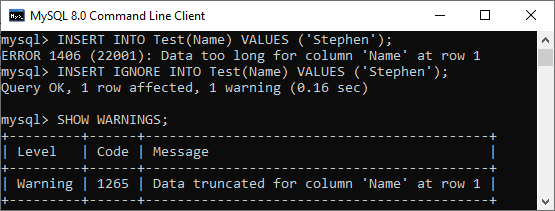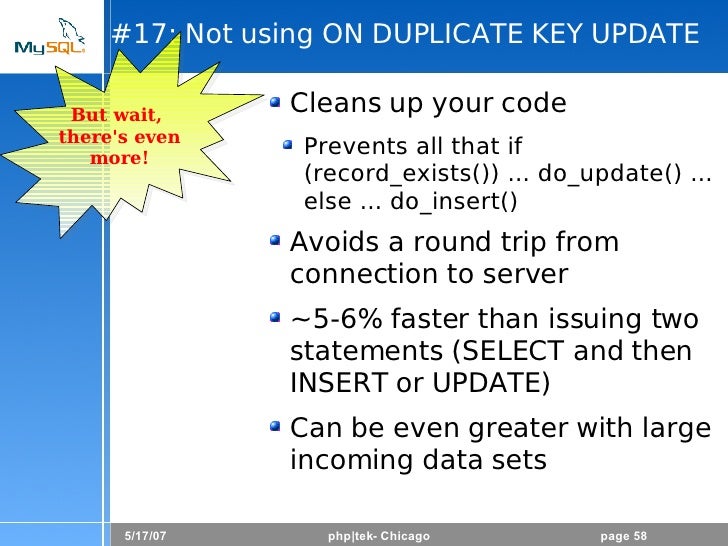

- #Mysql insert into if not exists else update how to
- #Mysql insert into if not exists else update update
- #Mysql insert into if not exists else update code
We’ve made the decision to change our department and joining_year of id = 101 record back to the original Operations record.
#Mysql insert into if not exists else update update
Use REPLACE INTO to Update the Record if It Exists Else Insert It in the MySQL Table When it’s required to insert rows after determining if they are, in fact, new or already exist, MySQL offers several helpful statements. Update Record if It Exists Else Insert It in the MySQL Table This article outlines the methods that can be used to correct this mistake and get a better result. MySQL will send an alert if a user tries inserting a record that already exists or has a duplicate PRIMARY KEY value. Values (getdate(), source.The database managers may occasionally need to add a record to the MySQL table or update one if it is regularly present. On (target.ClockDate = source.ClockDate and target.UserName = source.UserName) Using (select as source (ClockDate, UserName) Take into consideration that I'm declaring variables what are likely stored procedure parameters (I suspect). In your case it would look similar to the following code. MERGE statement is a beautiful TSQL gem very well suited for "insert or update" situations. I assume this based on the fact that you're using two where conditions in update statement later on in your code. In any case you cave too many closing braces. Inner select statement has only one where condition while UserName condition is excluded from the not exists due to invalid brace completion.
#Mysql insert into if not exists else update code
Your code has a typo in your if statement in not exists(select.) part.
#Mysql insert into if not exists else update how to
So knowing how to logic it out as shown above is still a valid technique.Īs others have suggested that you should look into MERGE statement but nobody provided a solution using it I'm adding my own answer with this particular TSQL construct. However, in some cases, especially with large data sets, the merge statement can be prohibitively slow, causing a lot of tran log activity. WHERE clockDate = '' AND userName = 'test'Īs others have pointed out, the merge statement is another way to tackle this same logic. IF (NOT EXISTS(SELECT * FROM Clock WHERE clockDate = '') If clockDate is NOT datetime field (just date), then the SQL engine will do it for you - no need to cast on a set/insert statement. If you are trying to compare to a date (without the time) you need to cast or the time element will cause the compare to fail. Note that getdate gives you the current date. WHERE Cast(clockDate AS Date) = '' AND userName = 'test'

I'm assuming that clockDate is a DateTime fields so try this: IF (NOT EXISTS(SELECT * FROM Clock WHERE cast(clockDate as date) = '')

Is this a Visual Studio error or a SQL error? And I'll read up on Merge Statements, thank you both for the links.Īt first glance your original attempt seems pretty close. This is the result I want but this error confuses me. My table results are: clockDate userName clockIn breakOut breakIn clockOut WHERE (clockDate = GETDATE()) AND (userName = 'test') IF NOT EXISTS (SELECT * FROM Clock WHERE (clockDate = GETDATE()) AND (userName = 'test')) I hope I have explained this properly, and thank you for your so with the clockDate as a date field and breakOut as a time(0) field, should this work? Cause I'm still getting a "The Compound statement SQL construct or statement is not supported." Syntax error even though it seems to be working. VALUES() AND userName = 'test')Īgain, this gives me the results I want, but not until after getting an error "Error in WHERE clause near 'CURRENT_DATE'. INSERT INTO Clock(clockDate, userName, breakOut) Here is what I tried: IF NOT EXISTS(SELECT * FROM Clock WHERE clockDate = '') AND userName = 'test') Where I'm stuck is if a user tries to clock out for break but never clocked in at the start of the shift, SQL needs to create a new row rather than update an existing. I'm playing around with the SQL backend right now and have a question about compound statements. I'm extremely new to SQL and am trying to develop a time clock application for the small office that I work in. I apologize, but this is kind of a two part question.


 0 kommentar(er)
0 kommentar(er)
